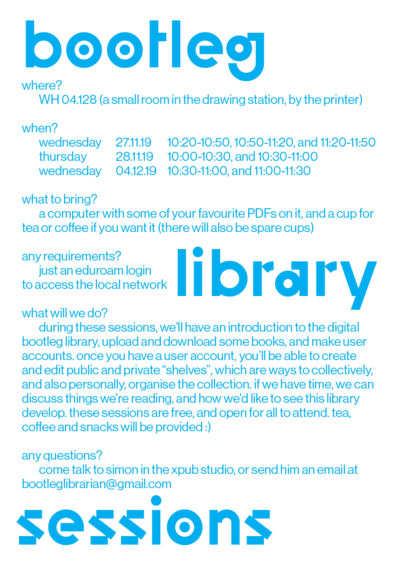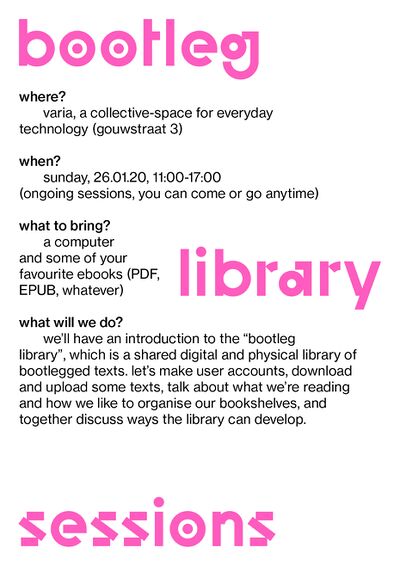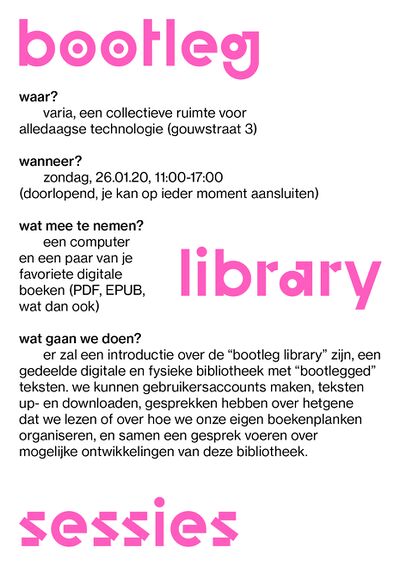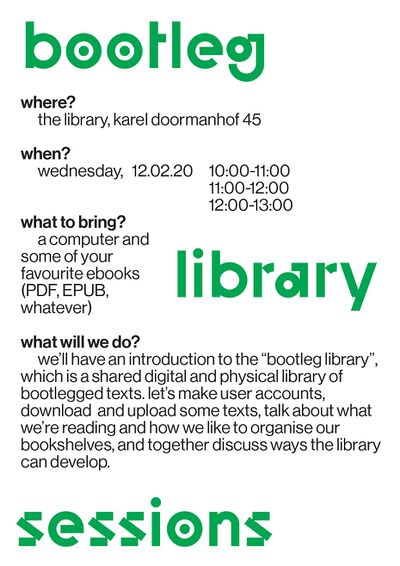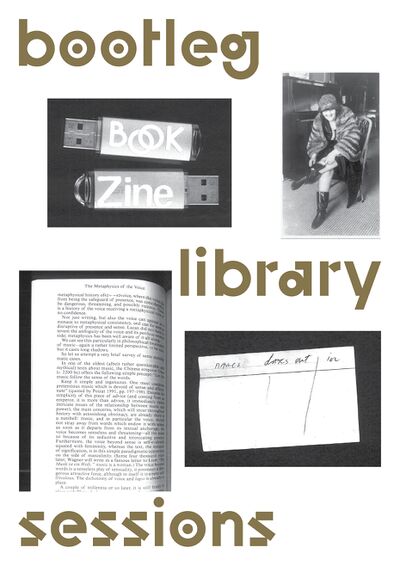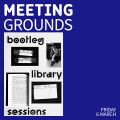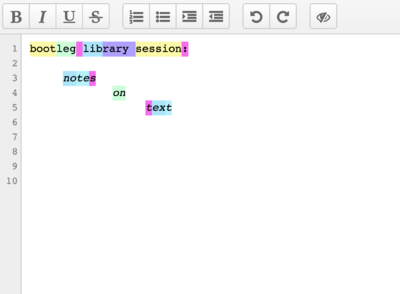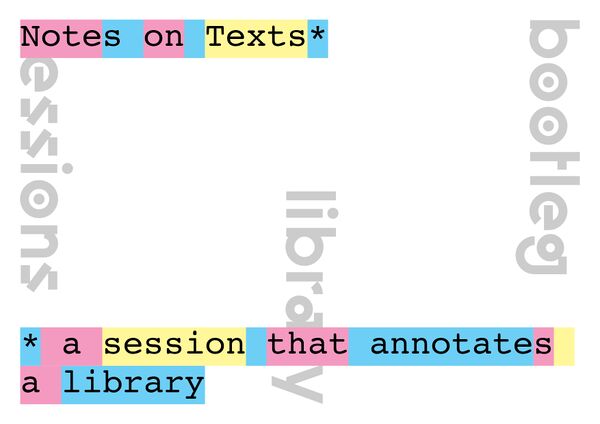User:Simon/bootleg library sessions: Difference between revisions
(→pad) |
|||
| Line 90: | Line 90: | ||
=== pad === | === pad === | ||
https://pad.xpub.nl/p/Bootleg_Library_at_Meeting_Grounds | https://pad.xpub.nl/p/Bootleg_Library_at_Meeting_Grounds | ||
{{User:Simon/20_03_06_Bootleg_Library_at_Meeting_Grounds_pad_dump}} | |||
== bootleg library at Art Meets Radical Openness 21.05.20 == | == bootleg library at Art Meets Radical Openness 21.05.20 == | ||
Revision as of 16:06, 5 June 2020
bootleg library sessions
The bootleg library sessions are a series of meetings in which we will:
- create user accounts
- collectively determine the development of desired features in the library
- upload and catalogue texts
- classify texts in shelves, both public and private
- download, read, annotate and discuss texts
- digitise printed matter, including scanning and OCR
- design, print and bind books for the physical bootleg library
Description pad: https://pad.xpub.nl/p/Bootleg_Library_Workshop_Sessions_full_text
bootleg library at wijnhaven 61, 27.11.19, 28.11.19 & 04.12.19
description
The first bootleg library sessions were held in Wijnhaven 61, a building that houses several of the Piet Zwart Institute Master's Departments, including XPUB, Lens-Based, MIARD, and the Master in Arts Education. The building also is home to many bachelor students, and stations where students can prototype work. I decided to run introduction sessions in a small room in the drawing station. I advertised these sessions with posters and flyers, distributed throughout Wijnhaven 61 and the adjacent Blaak building. Sessions were organised as a come-as-you-are basis, running for half-hour intervals, but with an open invitation for attendees to stay as long as they liked. The initial purpose of these sessions was to acquaint attendees with the digital bootleg library, explore the interface, and create registered user accounts. There was also another purpose of meeting with other readers to discuss texts we were reading, and how we gained access to them. I kept an Etherpad document open for each session, where I could take notes on what was discussed.
photos
pads
Description pad: https://pad.xpub.nl/p/Bootleg_Library_Workshop_Sessions
bootleg library sessions pad: https://pad.xpub.nl/p/bootleg_library_sessions
bootleg library at Varia's L.E.D. (Library and Electronic Depot), 26.01.20
description
Varia is a collective-space in Gouwstraat, Rotterdam. On the last Sunday of each month they open their doors to the public to read books from their library and repair electronics, in what is known as the L.E.D (Library & Electronic Depot). I held a bootleg library session at the first L.E.D., which ended up being a sunny, relaxing afternoon sitting on cushions, discussing bootlegs, scanning, piracy, and the type of strategies that the physical bootleg library could employ.
photos
pad
https://pad.xpub.nl/p/Bootleg_Library_at_Varia_text
bootleg library at the Library, Karel Doormanhof 45, 12.02.20
description
This bootleg library session was held in a new space at Karel Doormanhof 45, called "The Library". The building is home to studios for Piet Zwart Institute MA Fine Arts participants. The first hour of the session was initially only attended by one other participant, and then others arrived. All told, there session was attended by 5 participants, including myself. The attendees interests were well reflected in the type fo texts we discussed and shared - literary theory, writing, 60s counterculture, the occult and magick. This was the first time I used the Tasks of the Contingent Librarian cards - these were distributed over the table, and put on offer for participants to choose and begin conversations about the various tasks I had been writing about; e.g. reading/writing, skimming/scanning, bootlegging, reprinting, uploading/downloading etc. This provided an easy entry point for participants to approach the topic of bootlegging and the contingencies this type of library offered.
photos
bootleg library at Meeting Grounds, Onomatopee Projects, Eindhoven, 06.03.20
description
Meeting Grounds is a public program organised by Onomatopee Projects, a Dutch publisher and cultural space in Eindhoven. This bootleg library session was held in Eindhoven at Onomatopee HQ as part of Meeting Grounds. It was attended by a group of friends, who were all of similar ages. After we cooked lunch together, I invited participants to explore the printed books in the physical bootleg library, and also the A6 cards I had been producing for my thesis Tasks of the Contingent Librarian. I hoped these would spark conversation about our experiences of sharing files and piracy. The participants wrote notes in a pad as they made user accounts for the digital library, and personal anecdotes came out of our experiences of filesharing during our formative years, bootlegged Britney Spears cds and "chipped" game consoles that could play bootlegged games. Some quite interesting questions arose about our attitudes towards piracy, for example the difference in moral perspective between pirating books, and pirating films. I distributed some blank index cards for participants to write their thoughts on - some of them drew pictures, others stayed within the lines and wrote about texts they would like to download and upload. The interface of the card is a low entry point into being able to contribute texts without speaking out and interrupting a conversation, something I'd like to explore in the future. The cards provide feedback, and then become part of the index.
photos
pad
https://pad.xpub.nl/p/Bootleg_Library_at_Meeting_Grounds
03.06.20 bootleg library at meeting grounds documentation
/ b \ o / o \ t / l \ e / g \ l / i \ b / r \ a / r \ y /
\ a / t \
/ m \ e / e \ t / i \ n / g \ g / r \ o / u \ n / d \ s
-------------------------------------------
the bootleg library
https://hub.xpub.nl/bootleglibrary
-------------------------------------------
book sharing & annotation
calibre
ebook manager - you can download this, run it on your computer and share books over a local network using the content server function
https://calibre-ebook.com/
calibre-web
web app that the bootleg library runs on (a fork of the open-source calibre software)
https://github.com/janeczku/calibre-web
Annotation on the web - the holy grail with lots of projects:
https://beepb00p.xyz/annotating.html
also done very simply and effectively with genius:
https://genius.com/
-------------------------------------------
pirate/shadow/"extra-legal" libraries
Monoskop
https://monoskop.org/Monoskop
Library Genesis (collection is HUGE and mirrored) - i usually use the russian site
http://gen.lib.rus.ec/
Memory of the World
https://library.memoryoftheworld.org/#/books/
aaaaarg (only accessible by members. simon can invite you - just send him an email)
https://aaaaarg.fail/
ask for PDFs from people with institutional access
group for informal PDF sharing through a social network
https://www.facebook.com/groups/850609558335839/
Sci-Hub (this is mirrored too, try googling if the link is down):
https://mg.scihub.ltd/
ubu-web
kenneth goldsmith's baby - an archive of avant-garde cinema and writing
http://ubu.com/
Leeszaal
not an online pirate library, but a volunteer-run place in Rotterdam where you can borrow books, look up information, learn how to use LINUX, study or just read the newspaper. Books are not catalogued, and if you want to borrow one, just take it off the shelf and walk out with it :)
https://www.leeszaalrotterdamwest.nl/
-------------------------------------------
legal online libraries & archives
Project Gutenberg
books are within the public domain (70+ years after death of the author), so free of copyright restrictions:
https://www.gutenberg.org/
The Internet Archive
hosts a collection of books and more, also has the wayback machine (snapshots of web pages going back to the 90s)
https://archive.org/
--------------------------------------------
projects & open letters in support of and about piracy/peeracy
In solidarity with Library Genesis and Sci-Hub
an open letter calling for shadow librarians to come out of the shadows
http://custodians.online/
Alexandra Elbakyan to Mr. Robert W. Sweet (presiding judge in the Elsevier vs Sci-Hub et al court case)
https://torrentfreak.com/images/sci-hub-reply.pdf
and publishing
http://andpublishing.org/
The Piracy Project
http://andpublishing.org/the-piracy-project/
--------------------------------------------
loose thoughts from our conversation
misspellings on ebay - how to exploit this to find undiscovered items http://fatfingers.com
bootlegged DVDs and PS1 games - "chipping" to play bootlegged games
social capital accumulated from having a chipped console
The Pirate Book
historical stories of piracy - warez, demoscene, music etc:
https://hub.xpub.nl/bootleglibrary/read/290/pdf
selling unauthorised copies out of a car boot = "boot"legging?
why do we feel it's more threatening to pirate books than movies/music/games etc?
where does the text reside?
what if i read a book out loud and make a file on youtube - is it bootlegging?
can the library also have audio/visual media?
yes - the library is running on open-source software, so definitely possible. this requires an upgrade of the computer and data storage
what is more of a risk - a shared google drive of PDFs or the bootleglib?
a shared google drive is more risky - the bootleg library has several security measures in place to keep it private
will i get into trouble for using the bootleg library?
haha - not very likely :)
can readers communicate with each other through the bootleglib?
not directly, but possible by adding links to etherpads (like this one) in the description fields
--------------------------------------------
some interesting things to watch & read on archives, libraries, piracy and activism
things to read:
the science of piracy and the piracy of science by bodo balasz (an economist researching use of pirate libraries)
Part 1: http://copyrightblog.kluweriplaw.com/2019/03/06/the-science-of-piracy-the-piracy-of-science-who-are-the-science-pirates-and-where-do-they-come-from-part-1/
Part 2: http://copyrightblog.kluweriplaw.com/2019/03/21/the-science-of-piracy-the-piracy-of-science-who-are-the-science-pirates-and-where-do-they-come-from-part-2/
a view from elsewhere on authorship, copyright and creativity by eva weinmayr (of and publishing and the piracy project)
https://pzwiki.wdka.nl/mw-mediadesign/images/d/dd/Confronting_Authorship_Published_with_content_page--Whose_book_is_it_anyway.pdf
articles by shannon mattern on self-organised and "fugitive" libraries
https://placesjournal.org/article/marginalia-little-libraries-in-the-urban-margins/
https://placesjournal.org/article/fugitive-libraries/
interview with kate eichhorn, author of the archival turn in feminism
https://criticalmargins.com/interview-with-kate-eichhorn-author-of-the-archival-turn-in-feminism-a204b02ae340
things to watch:
Digital Amnesia
https://youtu.be/NdZxI3nFVJs
"Our memory is dissipating. Hard drives only last five years, a web page is forever changing and there’s no machine left that reads 15-year old floppy disks. Digital data is vulnerable. Yet entire libraries are shredded and lost to budget cuts, because we assume everything can be found online."
The Internet's Own Boy: The Story of Aaron Swartz
https://archive.org/details/TheInternetsOwnBoyTheStoryOfAaronSwartz
"The Internet's Own Boy depicts the life of American computer programmer, writer, political organizer and Internet activist Aaron Swartz. It features interviews with his family and friends as well as the internet luminaries who worked with him. The film tells his story up to his eventual suicide after a legal battle, and explores the questions of access to information and civil liberties that drove his work."
--------------------------------------------
King Gizzard And The Lizard Wizard
Polygondwanaland is free for everybody and you can do with what you.
From the band's post accompanying links to different digital packs:
"This album is FREE. Free as in, free. Free to download and if you wish, free to make copies.
Make tapes, make CD’s, make records.
[...]
Ever wanted to start your own record label? GO for it! Employ your mates, press wax, pack boxes. We do not own this record. You do. Go forth, share, enjoy."
https://www.discogs.com/King-Gizzard-And-The-Lizard-Wizard-Polygondwanaland/master/1268453
100 copies of the white album played at once
https://thevinylfactory.com/news/artist-layers-100-unique-copies-of-the-beatles-white-album-for-original-vinyl-release/
royalty-free audio
http://freesound.org
spotify scanning interface
http://everynoise.com/
sharpest knife ever made from {insert substance here}
https://www.youtube.com/channel/UCg3qsVzHeUt5_cPpcRtoaJQ
Bootleg Britney / A bootleg CD bought at the market in Montenegro had 3 extra unpublished songs in comparison to the actual album on sale in the shops - what message was Britney sending me?! i <3 this story
bootleg library at Art Meets Radical Openness 21.05.20
description
Bootleg Library Session: Notes on Texts The bootleg library is a particular, situated social infrastructure that operates from the understanding that the library is a collection of texts and readers. A reciprocal, self-reflexive relationship between the texts the readers produce, and the readers produced by the collection drives the sociability of the library. The bootleg library celebrates idiosyncrasy, and resists the singularity of the text.
A bootleg is an unauthorised copy of a source publication; bootlegging is a strategy by which texts acquire multiplicity of form and informal distribution methods, representing readers and connecting them with each other.
Abstract of session Notes on Texts is a session that annotates a library. It understands reading and writing to be fundamental library practices, and asks how new reader/writers may participate in producing texts that both describe the collection and represent themselves. This session will be centred around the *bootleg library*, a shared digital and physical collection of republished texts. Bootlegs; unauthorised copies of source publications that represent ourselves, our multiplicity and our shared interests. A library; a collection of texts and also the readers collected around them.
Previous bootleg library sessions have been moments to meet in various spaces with the people who frequent them, discuss things we read, add to the collection, and offer each other contingencies through the texts we share.
For this session we'll meet online in a web conference, in the digital bootleg library, and in a realtime collaborative text-editing environment. We'll explore how being together in- and out of sync and the mediums and techniques we use will shape the texts we share.
You are invited to experiment with annotation to produce texts by new readers (and writers), imagining ways that we can guide each other towards the things we read. What type of contingencies can we offer each other at our meeting and throughout AMRO2020, using the particular, situated social infrastructure the *bootleg library* maintains? How can we enrich texts through our annotations, and what kind of new texts can we produce through our notes?
Requirements The bootleg library has grown through individual contributions of a vast variety of texts. The collection includes many texts on critical feminist and media theory, literature, sound art, as well as technical manuals, but the collection is not exclusive to these interests. There is no set criteria for texts that can be included. Please come to this session with any ebooks that you are familiar with, are representative of your interests, and which you would like to share.
This session will focus specifically on annotation. Please prepare annotation(s) on the text(s) you'd like to include in the library.
File formats The bootleg library runs on calibre-web https://github.com/janeczku/calibre-web , and supports a wide range of file formats, including .pdf, .epub, .mobi, .docx, .odt, .rtf, .txt, .mp3, .mp4a, .cbr, .cbz, .cbt, and many more.
Outcomes
We planned to meet in an online web conference, in an Etherpad and in the digital bootleg library. This was tricky, given that many of us were meeting for the first time, and we didn't have the same visual cues to work with. After a brief tutorial, we went through the library and added annotations in a pad. This has been transposed here
The basic workflow was:
pdf > pad > markdown > pandoc > EPUB > library
We chose a page from a PDF in the library to annotate, then wrote on pad, collaboratively. Markdown was added to create basic structure (this was especially important for the hyperlinks), and then we exported a .txt file from the pad. This was then run through pandoc with the following command:
pandoc --from markdown --to epub my_etherpad.txt -o annotations.epub
The EPUB that was produced was then catalogued under the same listing as the PDF.

